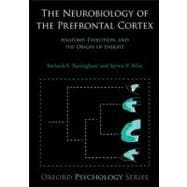
Note: Supplemental materials are not guaranteed with Rental or Used book purchases.
Purchase Benefits
What is included with this book?
| Introduction | |
| Evolution of the primate prefrontal cortex | |
| Medial prefrontal cortex: choosing actions based on outcomes | |
| Orbital prefrontal cortex: choosing objects based on outcomes | |
| Caudal prefrontal cortex: searching for goals | |
| Dorsal prefrontal cortex: generating goals based on recent events | |
| Ventral prefrontal cortex: generating goals based on visual and auditory contexts | |
| Prefrontal cortex as a whole: generating goals from current contexts and events | |
| Human prefrontal cortex: generating goals from instructions and imagination | |
| Conclusions | |
| Table of Contents provided by Publisher. All Rights Reserved. |
The New copy of this book will include any supplemental materials advertised. Please check the title of the book to determine if it should include any access cards, study guides, lab manuals, CDs, etc.
The Used, Rental and eBook copies of this book are not guaranteed to include any supplemental materials. Typically, only the book itself is included. This is true even if the title states it includes any access cards, study guides, lab manuals, CDs, etc.